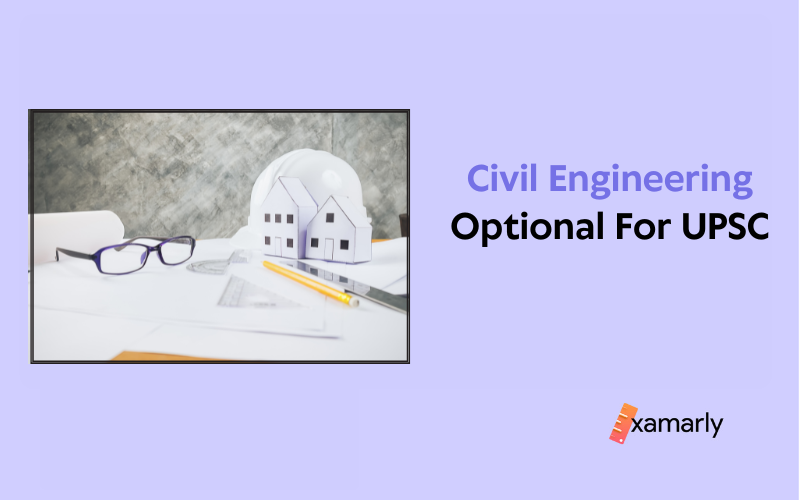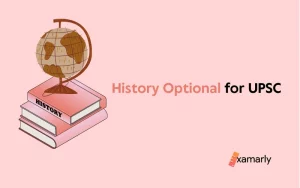UPSC offers three disciplines in the field of Engineering, namely electrical engineering, mechanical engineering, and civil engineering. Civil Engineering Optional is one of the Options an aspirant of the Engineering discipline prefers.
Let us look at the detailed analysis of the Civil Engineering Optional for UPSC. This article will help you examine the syllabus of the subject, the pros and cons, and the strategy for preparation.
- What Is Civil Engineering Optional For UPSC?
- How Many Opt Civil Engineering Optional For UPSC?
- Advantages
- Disadvantages
- Comparison/Similarity With Other Papers
- Civil Engineering Optional Syllabus For UPSC
- Civil Engineering Optional Syllabus For UPSC Paper I
- 1. Engineering Mechanics, Strength of Materials and Structural Analysis.
- 2. Design of Structures: Steel, Concrete and Masonry Structures.
- 3. Fluid Mechanics, Open Channel Flow and Hydraulic Machines:
- 4. Geotechnical Engineering :
- Civil Engineering Optional Syllabus For UPSC Paper II
- How To Prepare For The Civil Engineering Optional For UPSC?
- Who Should Opt For?
- Civil Engineering Books For UPSC Optional
- Conclusion
- FAQs On Civil Engineering Optional Subject For UPSC
What Is Civil Engineering Optional For UPSC?
The design, construction, and upkeep of the built environment, including projects like roads, canals, bridges, structures, and dams, are the focus of the engineering field known as civil engineering.
Topics like engineering mechanics, material strength, structural analysis, building design, geotechnical engineering, and other topics are in the Civil Engineering UPSC Mains exam.
Candidates with a deep knowledge of the subject and those who studied it in university or college usually take up this field.
Although not many students sign up for this Optional each year, the civil engineering optional subject for UPSC is considered a scoring choice in the UPSC exam.
How Many Opt Civil Engineering Optional For UPSC?
Success Rate
The success rate of aspirants clearing IAS with Civil Engineering as an Optional is not much since students prefer other Optional subjects that are not very specialized.
Less than 10 students were able to qualify for the IAS Mains for every 50-70 students on average every year.
Toppers Of UPSC CSE With Civil Engineering Optional
- With AIR 7 in 2020, Praveen Kumar was on the top with Civil Engineering as an Optional.
- Abhishek Saraf secured AIR 8 in UPSC 2019 exam with Civil Engineering as an Optional.
- Sameer Kumar Jena opted for Civil Engineering as an Optional in 2017.
- In 2016. it was Avdhesh Meena. In 2014 Vinay Tiwari took Civil Engineering Optional and in 2013, Ashish Vashishth secured AIR 15.
Advantages
Students looking for a subject that will help them land a job in the civil service can opt for civil engineering optional for UPSC.
It is a science-based subject that requires thorough knowledge of concepts. This subject can give a candidate a significant edge over non-engineers.
The advantages of opting for Civil Engineering Optional for UPSC are-
- You’d be conversant with the topic if you are a Civil Engineering graduate as you have studied the subject for four years.
- Due to its foundation in science and mathematics, it is a subject that scores well. With enough preparation, you can achieve good marks.
- Marks can be earned using plenty of diagrams and numbers.
- Aspirants need not memorize anything. All they require is a firm grasp and conceptual clarity.
- In contrast to the humanities topics, nothing is left up to the examiner’s interpretation.
- UPSC Civil Engineering preparation can help aspirants with Engineering Services Exam.
Disadvantages
There can never be only advantages to anything. Pros and Cons go parallel.
The disadvantages of UPSC Civil Engineering Optional are-
- The syllabus is very large. A proper time is essential to complete the syllabus before the exam.
- The two papers in the UPSC Civil Engineering optional are quite long, and many candidates have reported having trouble finishing them.
- The subject does not overlap with other Optional Subjects and compulsory subjects such as GS.
- Dynamic questions from UPSC can be challenging to respond to without in-depth subject expertise.
- The Optional is no doubt a scoring subject but produces Average marks.
Aspirants need to look into the disadvantages along with the advantages before opting for UPSC Civil Engineering Optional.
Comparison/Similarity With Other Papers
Comparing one Optional subject to another is a common practice, particularly in UPSC. The comparison helps to know if studying for one paper can get you to help in another or not.
However, in the case of Civil Engineering Optional, no such similarity is observed.
Help With Essay Paper
The UPSC Civil Engineering Optional is a lengthy paper and the syllabus is also wide. Therefore, preparing for this Optional would help you with writing long paragraphs within the time limit.
Moreover, Engineers are meant to be creative in the field, and Civil Engineers design buildings and stuff, as a result, creativity can help the aspirants to write beautiful essays.
Help In Interview
The Interview is the last stage of the whole UPSC process. The interview questions depend on the subject and the interviewer. Civil Engineering Optional can help in the process because of the creativity and the subject knowledge.
Also, the interviewers check for the applicants’ grasp of fundamental ideas and application of knowledge to sustainable development issues, which Civil Engineering Optional students can easily apply and crack the interview.
Civil Engineering Optional Syllabus For UPSC
Civil Engineering Optional Syllabus For UPSC Paper I
1. Engineering Mechanics, Strength of Materials and Structural Analysis.
1.1 Engineering Mechanics :
Units and Dimensions, SI Units, Vectors, Concept of Force, Concept of particle and rigid body. Concurrent, Non- Concurrent and parallel forces in a plane, moment of force free body diagram, conditions of equilibrium, Principle of virtual work, equivalent force system.
First and Second Moment of area, Mass moment of Inertia.
Static Friction.
Kinematics and Kinetics: Kinematics in cartesian Co-ordinates, motion under uniform and non-uniform acceleration, motion under gravity. Kinetics of particle : Momentum and Energy principles, collision of elastic bodies, rotation of rigid bodies.
1.2 Strength of Materials :
Simple Stress and Strain, Elastic constants, axially loaded compression members, Shear force and bending moment, theory of simple bending, Shear Stress distribution across cross sections, Beams of uniform strength.
Deflection of beams: Mecaulay’s method, Mohr’s Moment area method, Conjugate beam method, unit load method. Torsion of Shafts, Elastic stability of columns, Euler’s, Rankine’s and Secant formulae.
1.3 Structural Analysis :
Castiglianio’s theorems I and II, unit load method, of consistent deformation applied to beams and pin jointed trusses. Slope-deflection, moment distribution.
Rolling loads and Influences lines : Influences lines for Shear Force and Bending moment at a section of a beam. Criteria for maximum shear force and bending Moment in beams traversed by a system of moving loads. Influences lines for simply supported plane pin jointed trusses.
Arches : Three hinged, two hinged and fixed arches, rib shortening and temperature effects.
Matrix mehods of analysis : Force method and displacement method of analysis of indeterminate beams and rigid frames.
Plastic Analysis of beams and frames : Theory of plastic bending, plastic analysis, statical method, Mechanism method.
Unsymmetrical bending: Moment of inertia, product of inertia, position of Neutral Axis and Principal axes, calculation of bending stresses.
2. Design of Structures: Steel, Concrete and Masonry Structures.
2.1 Structural Steel Design :
Structural steel : Factors of safety and load factors. Riveted, bolted and welded joints and connections. Design of tension and compression members, beams of built up section, riveted and welded plate girders, gantry girders, stancheons with battens and lacings.
2.2 Design of Concrete and Masonry Structures:
Concept of mix design. Reinforced Concrete : Working Stress and Limit State method of design— Recommendations of I. S. codes. Design of one way and two way slabs, stair-case slabs, simple and continuous beams of rectangular, T and L sections. Compression members under direct load with or without eccentricity.
Cantilever and Counter fort type retaining walls.
Water tanks : Design requirements for Rectangular and circular tanks resting on ground. Prestressed Concrete : Methods and systems of prestressing, anchorages, Analysis and design of sections for flexure based on working stress, loss of prestress.
Design of brick masonry as per I. S. Codes
3. Fluid Mechanics, Open Channel Flow and Hydraulic Machines:
3.1 Fluid Mechanics :
Fluid properties and their role in fluid motion, fluid statics including forces acting on plane and curve surfaces.
Kinematics and Dynamics of Fluid flow : Velocity and accelerations, stream lines, equation of continuity, irrotational and rotational flow, velocity potential and stream functions.
Continuity, momentum, energy equation, Navier Stokes equation, Euler’s equation of motion, application to fluid flow problems, pipe flow, sluice gates, weirs.
3.2 Dimensional Analysis and Similitude: Buckingham’s Pi-theorem, dimensionless parameters.
3.3 Laminar Flow :
Laminar flow between parallel, stationary and moving plates, flow through tube.
3.4 Boundary layer :
Laminar and turbulent boundary layer on a flat plate, laminar sub-layer, smooth and rough boundaries, drag and lift.
Turbulent flow through pipes : Characteristics of turbulent flow, velocity distribution and variation of pipe friction factor, hydraulic grade line and total energy line.
3.5 Open Channel Flow :
Uniform and non-uniform flows, momentum and energy correction factors, specific energy and specific force, critical depth, rapidly varied flow, hydraulic jump, gradually varied flow, classification of surface profiles, control section, step method of integration of varied flow equation.
3.6 Hydraulic Machines and Hydropower :
Hydraulic turbines, types classification, Choice of turbines performance parameters, controls, characteristics, specific speed.
Principles of hydropower development.
4. Geotechnical Engineering :
Soil Type and Structure—gradation and particle size distribution—consistency limits.
Water in soil—capillary and structural—effective stress and pore water pressure—permeability concept—filed and laboratory determination of permeability—Seepage pressure—quick sand conditions—Shear strength
determination—Mohr Coulomb concept.
Compaction of soil—Laboratory and filed test.
Compressibility and consolidation concept— consolidation theory—consolidation settlement analysis.
Earth pressure theory and analysis for retaining walls, Application for sheet piles and Braced excavation.
Bearing capacity of soil—approaches for analysis- Filed tests—settlement analysis—stability of slope of earth walk.
Subsuface exploration of soils—methods
Foundation—Type and selection criteria for foundation of structures—Design criteria for foundation—Analysis of distribution of stress for footings and pile—pile group action—pile load test.
Ground improvement techniques.
Civil Engineering Optional Syllabus For UPSC Paper II
1. Construction Technology, Equipment, Planning and Management
1.1 Construction Technology Engineering Materials :
Physical properties of construction materials with respect to their use in construction—Stones, Bricks and Tiles; Lime, Cement, different types of Mortars and Concrete.
Specific use of ferro cement, fibre reinforced C. C., High stength concrete.
Timber; Properties defects—common preservation treatments.
Use and selection of materials for specific use like Low Cost Housing, Mass Housing, High Rise Buildings.
1.2 Construction :
Masonry principles using Brick, stone, Blocks—construction detailing and strength characteristics.
Types of plastering, pointing, flooring, roofing and construction features.
Common repairs in buildings.
Principle of functional planning of building for residents and specific use—Building code provisions.
Basic principles of detailed and approximate estimating—specification writing and rate analysis-principles of valuation of real property.
Machinery for earthwork, concreting and their specific uses—Factors affecting selection of equipments—operating cost of equipments.
1.3 CONSTRUCTION PLANNING AND MANAGEMENT :
Construction activity—schedules—organization for construction industry—Quality assurance principles.
Use Basic principle of network—analysis in form of CPM and PERT—their use in construction monitoring, Cost optimization and resource allocation.
Basic principles of Economic analysis and methods.
Project profitability—Basic principles of Boot approach to financial planning-simple toll fixation criterions.
2. Surveying and Transportation Engineering
2.1 Surveying : Common methods and instruments for distance and angle measurement for CE work—their use in plane table, traverse survey, levelling work, triangulation, contouring and topographical map. Basic principles of photogrammetry and remote sensing.
2.2 Railways Engineering : Permanent way—components, types and their function-Functions and Design constituents of turn and crossing— Necessity of geometric design of track—Design of station and yards.
2.3 Highway Engineering : Principles of Highway alignments—classification and geometrical design elements and standards for Roads.
Pavement structure for flexible and rigid pavements—Design principles and methodology of pavements.
Typical construction methods and standards of materials for stabilized soil, WBM, Bituminous works and CC roads.
Surface and sub-surface drainge arrangements for roads—culvert structures.
Pavement distresses and strengthening by overlays.
Traffic surveys and their application in traffic planning—Typical design features for channelized, intersection rotary etc.—signal designs—standard Traffic signs and markings.
3. Hydrology, Water Resources and Engineering:
3.1 Hydrology :
Hydrological cycle, precipitation, evaporation, transpiration, infiltration, overland flow, hydrograph, flood frequency analyses, flood routing through a reservoir, channel flow routing—Muskingam method.
3.2 Ground Water flow :
Specific yield, storage coefficient, coefficient of permeability, confined and unconfined aquifers, aquifers, aquitards, radial flow into a well under confined and unconfined conditions.
3.3 Water Resources Engineering :
Ground and surface water resources, single and multipurpose projects, storage capacity of reservoirs, reservoir losses, reservoir sedimentation.
3.4 Irrigation Engineering :
(i) Water requirements of crops : consumptive use, duty and delta, irrigation methods and their efficiencies.
(ii) Canals : Distribution systems for cannal irrigation, canal capacity, canal losses, alignment of main and distributory canals, most efficient section, lined canals, their design, regime theory, critical shear stress, bed load.
(iii) Water logging : causes and control, salinity.
(iv) Canal structures : Design of head regulators, canal falls, aqueducts, metering flumes and canal outlets.
(v) Diversion head work : Principles and design of weirs on permeable and impermeable foundation, Khosla’s theory, energy dissipation.
(vi) Storage works : Types of dams, design, principles of rigid gravity stability analysis.
(vii) Spillways : Spillway types, energy dissipation.
(viii) River training : Objectives of river training, methods of river training.
4. Environmental Engineering
4.1 Water Supply :
Predicting demand for water, impurities of water and their significance, physical, chemical and bacteriological analysis, waterborne diseases, standards for potable water.
4.2 Intake of Water :
Water treatment: principles of coagulation, flocculation and sedimentation; slow-, rapid-, pressure-, filters; chlorination, softening, removal of taste, odour and salinity.
4.3 Sewerage Systems :
Domestic and industrial wastes, store sewage—separate and combined systems, flow through sewers, design of sewers.
4.4 Sewage Characterisation :
BOD, COD, solids, dissolved oxygen, nitrogen and TOC. Standards of disposal in normal water course and on land.
4.5 Sewage Treatment :
Working principles, units, chambers, sedimentation tank, trickling filters, oxidation ponds, activated sludge process, septic tank, disposal of sludge, recycling of waste water.
4.6 Solid waste :
Collection and disposal in rural and urban contexts, management of long-term ill-effects.
5. Environmental pollution :
Sustainable development. Radioactive wastes and disposal. Environmental impact assessment for thermal power plants, mines, river valley projects. Air pollution. Pollution control acts.
How To Prepare For The Civil Engineering Optional For UPSC?
Preparing for any Optional is always a dedicated task. But for a few subjects, such as Engineering, the preparation may require extra effort, especially for non-engineering backgrounds.
Therefore, this Optional benefits the students who had Civil Engineering during their Bachelor’s, as they have four years of in-depth subject knowledge.
However, the preparation by both sorts of aspirants requires a few things in common-
- Decide on the best references.
- Create and adhere to a study plan.
- Create your preparation notes.
- Practice the test questions from last year.
- Working on a few Mock Tests increases the chances of success.
The Civil Engineering Optional doesn’t require knowing numerous facts and figures or memorization as this subject is based on science. Aspirants can easily earn good grades if their fundamentals are clear. Make your foundation solid and obvious, as it can be tough to pass without a strong foundation in the subject. Besides, questions are dynamic, which can be difficult to answer if you don’t know your subject.
Mastering The Subject From Basics
A thorough understanding of the subject, especially the basics, is crucial while preparing for UPSC.
Without having clarity of concepts, the preparation can be a difficult task. So, how to prepare for the Civil Engineering Optional subject, let’s find out.
- Syllabus knowledge:-
- A solid understanding of the entire syllabus of Civil Engineering is the first and foremost step of the preparation. Without achieving this step, an aspirant can never prepare fully and nicely.
- The syllabus is vast and requires a significant time for completion before the Mains exam.
- Previous year papers:-
- Another important task is to cover and solve the previous year’s question papers for a good understanding of the Mains exam. Try solving as many question papers as you can within the time limit.
- Reference Books-
- Studying from standard books is always a wise choice as these books can help in a clear understanding of the topics.
- Practice:-
- You will be required to create a variety of diagrams to illustrate your answers to the questions. Hence, practice often.
- By practicing answer writing, you can improve your answer-writing skills and increase your grade. Drawing diagrams correctly on the final exam will be made easier for you if you have practiced.
- Exam pattern:-
- The question sheets follow a particular pattern. Discovering the question patterns can help you learn about the crucial subjects frequently asked in the UPSC.
- Study plan:-
- The study plan will help cover the entire course logically. But stick to the study schedule with utmost commitment and vigilance. It is essential to cover every subject thoroughly, leaving no topics out if you want to ace the exam.
- Prepare good notes to help you when you get stuck. The notes should contain important derivations, formulas, theories and concepts, especially for Paper II.
- Writing:-
- Since the paper, is lengthy and the syllabus is vast, practice writing as much as possible in a crisp manner.
- When practicing civil engineering test answers, use diagrams and graphical pictures as needed.
- Lastly, revision is necessary and very much needed to analyze your preparation.
Who Should Opt For?
Academic background is an important part of a UPSC aspirant. Having a good background will fetch you marks with not much difficulty.
Many Engineering students look at IITs and NIT for admission and a better future. However, the institutes are not the selection criteria for UPSC, but a good knowledge of the subject is what all require to crack the UPSC Civil Engineering Optional.
Students already familiar with Civil Engineering would find it easy to study the Civil Engineering Optional compared to students from other backgrounds. This is obvious because the student had studied the subject for 4 years.
Therefore, most students of Civil Engineering take up the UPSC Civil Engineering Optional.
This does not mean that other students can not take this as an Optional subject. But they will require extra effort to start from scratch.
The Civil Engineering Optional is one of the toughest subjects in the UPSC exam. Therefore, you should plan your preparation strategically and thoroughly prepare for the exam. Civil engineering is a high-scoring subject, and one can expect to get a great score if one studies it well.
Civil Engineering Books For UPSC Optional
It is essential to follow a standard reference while preparing for UPSC exams. For Civil Engineering students, it is highly advisable to stick to the reference books since the syllabus is vast and would get the aspirants confused with the concepts.
Some of the Reference books are-
- Engineering Mechanics by Irvin Shames
- Limit State Design by Ram Chandra
- Strength of Material by Stephen Timoshenko
- Basic and Applied Fluid Mechanics by Garde
- Design of steel structure by Duggal
- Soil Mechanics by K.R Arora
- Engineering Hydrology by K. Subramanya
- Prestressed concrete by N Krishna Raju
- Hydraulics and Fluid mechanics including Hydraulics machines by Modi and Seth
- Railway Engineering by Saxena and Arora
Link of Relatable Articles:
Conclusion
Civil Engineering as an Optional is mostly chosen by Engineering graduates because of the prior knowledge of the Graduation concepts. Students from other fields can also take up the Optional if they have an understanding of basic concepts and are ready to give extra time and effort to cover the whole syllabus with a proper understanding.
The aspirants can adopt many strategies, like, Solving Previous Year’s Question Papers, knowing about the test pattern in advance, and practicing difficult questions and a range of questions. They can also enroll for Mains Test Series to analyze themselves in the preparation journey.
In Conclusion, Civil Engineering as an Optional is a scoring subject but the results are average.
You’ll do better on the test if you have a crystal-clear conceptual understanding. If you are familiar with the fundamentals, you can easily answer the majority of the questions.
FAQs On Civil Engineering Optional Subject For UPSC
What Time Duration Is Required For Preparation?
The Civil Engineering Optional for UPSC requires 4 to 5 months for civil engineering students and more than 9 months for non-belonging students. Candidates are advised to dedicate 9 to 11 hours per day to the Civil Engineering Optional as the syllabus is vast and complex.
Is Calculator Allowed In UPSC Civil Engineering Optional?
At the subjective UPSC Mains Exam, candidates will be permitted to utilize Scientific (Non-Programmable type) Calculators. However, programmable calculators will not be permitted, and applicants who use them will be considered to have used unfair means






